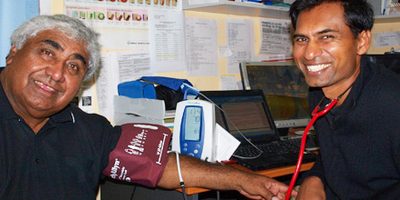
Smartphone: the answer for India's heart health?
More than 30 million people suffer a heart attack each year in india. For those living in rural regions such as Andhra Pradesh on the south eastern coastline of India, the rate of cardiovascular disease is particularly high and the development and implementation of effective, low-cost preventive and therapeutic strategies is a public health priority.
Under conditions where health systems are poorly equipped to deal with the rise of cardiovascular disease, innovative ideas are desperately needed to improve the healthcare landscape.
Thanks to new funding from The Global Alliance for Chronic Diseases via Australia’s national peak health and medical body, the National Health and Medical Research Council, The George Institute, India, is harnessing smartphone technology in a new project focused on rural India.
The pilot study, initially called ‘HealthTracker India’ aims to improve screening for cardiovascular risks in the primary healthcare system, while building local capacity to deal with these issues in the long term – supported by an intelligent smartphone application.
Using World Health Organization guidelines, the smart-phone application will guide health workers in rural India through a series of questions to assess a patients blood pressure, blood sugar, weight and height. The answers are entered into HealthTracker, which then calculates a comprehensive risk profile that is uploaded to a secure electronic health record. High risk individuals are then referred to see a doctor who follows a management plan for the patient’s long term care. The guide is based on the best available evidence in cardiovascular care, and is also designed to build capacity in primary healthcare in rural India.
“HealthTracker, India will train both primary care physicians and non-physician health workers to better identify cardiovascular risks such as raised blood pressure, high cholesterol and diabetes as major red flags for the potential of suffering from a heart attack. We will assess the benefits of smartphone application to predict a patient’s ten year risk of cardiovascular disease”, said Dr Pallab Maulik, Head of Research and Development at The George Institute, India.
“This project focuses on a complex yet practical intervention to address the growing cardiovascular epidemic in India. It combines a technological solution with innovative strategies to empower the local health workforce. The pilot findings will be used to inform a large scale trial in rural India. Our goal is to provide rigorous evidence on a strategy that might lead to better health care for under-served populations in low and middle income countries”, added Dr David Peiris, Principal Investigator.




